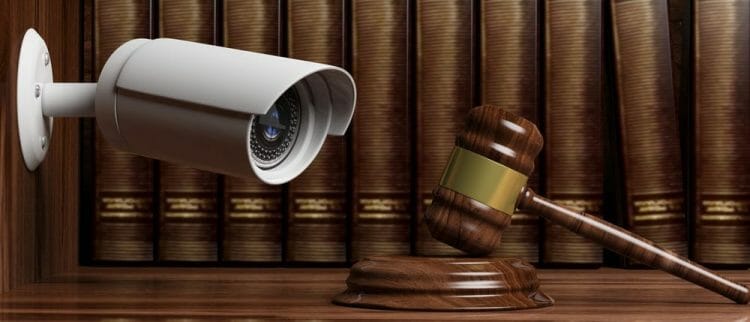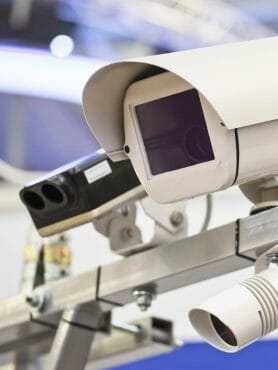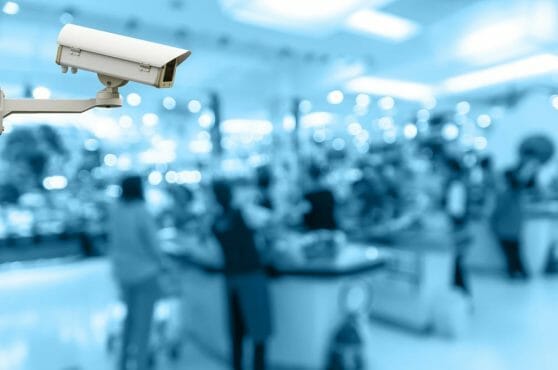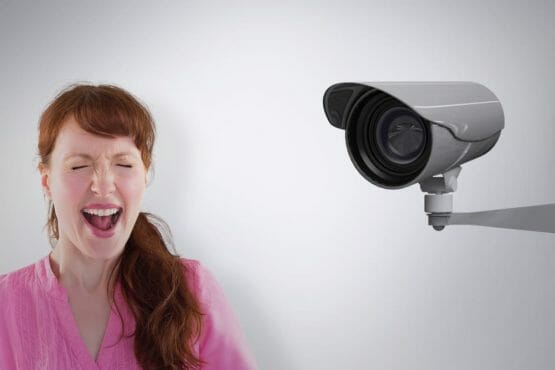Quick Navigation
Technological advances have made home security surveillance systems affordable, so they are becoming more popular for home and small business use. At the same time, people have a right to privacy, so the question of the legality of monitoring people comes up. An important thing to realize is that video surveillance and audio recordings are treated very differently by the law. Home and business use are also treated very differently. The key is that people have a right to know their actions are being recorded.
Video surveillance cameras are legal on your property or your business, with the only exceptions being private areas like the bathroom. Dressing rooms, bedrooms of adults, or any place you would expect privacy is off-limits. In a business setting, you must notify people video surveillance is in use, and if they stay that is considered consent.
The federal wiretap act, however, changed what is legal especially from an audio standpoint and it is a lot more complicated. Also using Wi-Fi to record audio is illegal and could be considered a cybercrime. State audio surveillance laws are different in their audio recording laws. Various state laws may be more restrictive than federal law. It is generally not legal now to record audio without the person’s consent. This means you could not record general audio in your kitchen, or other places, at home without the knowledge and consent of people there. The wiretap act was aimed at things like telephones and other communication devices, but home cameras used in security systems fall under this law.
If someone starts recording in your home or business, you also have the right to tell them to stop. If they do not, they are guilty of trespassing.
Is Recording Audio Without Consent Illegal?

in most cases, no it is not legal to record audio without consent. The problem is not the recording. The problem is that people who may be recorded have a right to know the recording is taking place. There are ways to record sound legally, and it involves having the consent of the people being recorded.
Privacy laws are aimed at protecting individual rights. The laws were perhaps meant for phone calls and electronic communication, but the recording of any sound is included. If you want to have the best security camera for your business, you may post a sign advising people they are being recorded. People have the option of leaving if they do not wish to be recorded. Recording audio is still a bit stricter though. If you notify people cameras are in use, video surveillance consent is implied.
The same is not true for audio. Some states require only one-party consent, and some require two or even all-party consent. There are 12 states that do not accept one-party consent and require consent for all involved. One-party consent means only one of the people involved in a conversation must give consent. A hidden microphone on your body could be legal because you gave consent. The remaining 38 states have variations on the law but generally do allow one-party consent for recording audio.
Do security cameras have sound?

Surveillance cameras keep getting more sophisticated, and even more affordable. Many do not come with sound simply because of all the laws around recording sound. More systems are now coming with video and audio capabilities. That increases your options, but it also increases your responsibility to use the audio legally.
Sound capabilities are being included in more and more systems for home and business use. It is legal to record video and sound in your home when no one is there. It could be useful if there was a burglar, to have sound as well as video.
That would be legal. It’s easy enough to shut off the sound control when there are guests in the house. But remember you must have consent if you want to record sound even in your own home. It is not legal to record private conversations when two people are talking and neither of them knows or has consented, to being recorded. There is some ambiguity, however. A general sound recording of a room full of people might not get you in trouble.
It is legal then if you have consent or if it is a “public” location. Recording a burglar when you are not home is legal with both video and sound. The best surveillance cameras have sound input so you can hook up a microphone when it is legal. Remember it is illegal to use WiFi to record sound. Many systems record everything in the Cloud on the Internet, so you would be using the Internet in that situation. This could be considered a cybercrime and get you in even more trouble. Closed circuits, of CCTV, is different as it does not use an outside recording device. CCTV systems use a memory card, and often start over recording over previous material when it gets full. You have a lot more flexibility when it comes to recording sound with a CCTV system.
Can employers have cameras with audio?

There are a lot of restrictions on audio recordings, and not too many on video. Keep in mind though, there are a lot of differences in home and business use. You may record employees if you have notified them. You may also monitor computers, phones, and other devices that belong to the company. It gets a little gray when people take business computers home or bring personal devices to work, but in general, the two are treated very differently.
Phone conversations of employees made on company phones could be monitored, for instance. A private conversation between two employees who are in a private area would not be legal unless one of them had given consent. What employees do online at the business could be recorded legally, while it is on the business property. The most important thing is that the person is notified that an audio recording is taking place, which gives them the option of not participating.
Some employers record interviews with candidates for jobs and consent is required for this. Some add the requirement that consent is given for future recordings to protect the business. This is often done at the job interview, or signs are posted, and this is legal notification and that is all that is required at work.
Another aspect of this is the “expectation of privacy.” This means there are areas where you should be able to assume you are not being watched or recorded. This would be like a bathroom, changing area, or a bedroom for adults. Conversations on your private phone at work could not be legally recorded by the company, but if you are using the company’s WiFi, that could be subject to surveillance.
If you are in a business or at work for a business, you do not have the expectation of privacy. It is sort of a public space even if it is privately owned. Recordings of crowds inside a building, in general, are legal. However, you must still respect those areas where the expectation of privacy exists, such as bathrooms and changing rooms.
Hidden microphones
An important part of the law is that people have a right to know if they are being recorded. This means it is illegal to have a hidden camera with a hidden microphone. The law refers to “disguised” recording devices. The latest security systems have separate controls and inputs for audio and video because of the difference in legalities. There are other methods of recording which are legal depending on your state, even without consent. But sound for a general surveillance system still requires consent for it to be legal.
The bottom line
Home surveillance systems give you an extra sense of security because you can keep an eye on your property no matter where you are. While this is great, other people have rights as well, and the courts have decided individuals have a right to privacy. You may still have a surveillance system in “public” areas of your home and business for video recording.
Keep in mind audio recording laws. Of course, this would not apply to bathrooms or changing rooms. The rules for audio are stricter because of wiretapping rules, so you gave to be careful. Most states require some level of consent to voice recording, whether in business or at home. This is why many surveillance systems do not come with audio. They may have audio connections that you can hook a microphone to later.

